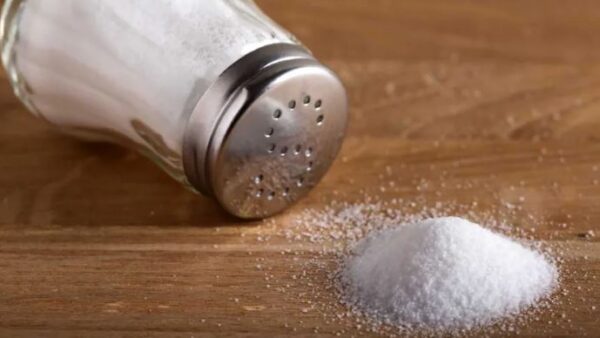here’s no denying that salt is the most essential kitchen ingredient.
Right from adding a twist of taste to meals to maintaining healthy blood pressure levels to fixing electrolyte imbalances in the body, this oh-so-humble salt has numerous benefits and roles to play in defining our health and well-being.
But what if we tell you that switching from regular salt to sea salt can simply fix health issues as well as slow down
skin aging?
Why salt?
The addition of salt can make or break your meal experience, and undeniably, it is one of the most essential ingredients in every kitchen.
But you will be amazed to know that switching to sea salt can instantly amp up the taste, texture and health quotient. This is because sea salt is a type of salt that is harvested by evaporating seawater.
What makes sea salt different from regular salt?
Unlike table salt, which is extracted from underground salt deposits and is heavily processed, sea salt is obtained through natural evaporation processes, retaining a range of minerals and trace elements. Its production involves collecting seawater in shallow ponds or salt beds, allowing it to evaporate under the sun, and then harvesting the remaining salt crystals. The result is a mineral-rich product that varies in texture and flavor depending on the source.
What makes sea salt a healthy alternative?
Sea salt is a natural source of essential minerals and trace elements that contribute to overall health. Primarily composed of sodium chloride, it also contains varying amounts of other nutrients such as magnesium, calcium, and potassium, which are crucial for maintaining fluid balance, bone health, and muscle function. Additionally, sea salt provides small quantities of iron, which supports oxygen transport, and zinc, important for immune function. The specific mineral content can vary depending on the source, but sea salt is generally richer in trace minerals compared to heavily processed table salt.
Sea salt’s benefits extend beyond the kitchen, as it can also play a role in skincare. Its mineral content is thought to offer several advantages in reversing
skin aging:
Exfoliation: The coarse texture of sea salt makes it an effective natural exfoliant. Regular exfoliation helps remove dead skin cells, promoting cell turnover and revealing fresher, younger-looking skin.
Hydration: Minerals like magnesium and calcium in sea salt can help improve skin hydration. Magnesium, in particular, supports the skin’s barrier function, reducing moisture loss and keeping the skin supple.
Detoxification: Sea salt can help draw out impurities from the skin. When used in baths or as part of a skincare regimen, it helps cleanse and purify the skin, reducing the appearance of blemishes and promoting a clearer complexion.
Anti-inflammatory properties: The minerals in sea salt have anti-inflammatory effects that can soothe irritated skin and reduce redness, which is beneficial for maintaining a youthful appearance.
Including sea salt in your skincare routine, either through exfoliating scrubs or mineral-rich baths, can provide these benefits, contributing to healthier and more resilient skin. However, it’s important to use it in moderation to avoid potential irritation, and it’s always a good idea to patch-test new skincare products or treatments. Moreover, sea salt is more than just a seasoning—it’s a versatile product with nutritional benefits and potential skincare advantages that set it apart from regular table salt.
Other health benefits of sea salt
Sea salt is not just a flavorful seasoning but also a source of several health benefits. Its rich mineral content and minimal processing make it a valuable addition to a balanced diet. Here are some lesser-known health benefits of adding sea salt to the daily diet.
1. Supports hydration
Sea salt is packed with essential minerals like sodium, potassium, and magnesium, which play a crucial role in maintaining proper fluid balance in the body. Sodium and potassium help regulate hydration levels by controlling fluid movement in and out of cells and tissues. Consuming sea salt in moderation can aid in replenishing electrolytes lost through sweat and support overall hydration.
2. Improves digestion
The minerals in sea salt, particularly sodium chloride, stimulate digestive enzymes and aid in the production of digestive fluids. This can enhance the digestive process, helping to break down food more efficiently and potentially alleviating issues like indigestion and bloating. Additionally, sea salt’s ability to balance stomach acid levels can contribute to better digestive health.
3. Promotes healthy skin
Sea salt contains minerals that can benefit the skin. Magnesium, for instance, helps improve skin hydration and reduce inflammation, while calcium supports the skin’s barrier function. Sea salt is often used in skincare products and treatments for its exfoliating properties and its ability to draw out impurities, leaving the skin smoother and healthier.
4. Enhances respiratory health
Inhaling steam infused with sea salt or using salt therapy (halotherapy) can have therapeutic effects on respiratory health. Sea salt has antimicrobial properties that may help clear mucus from the airways, reduce inflammation, and alleviate symptoms of respiratory conditions like asthma, bronchitis, and sinusitis.
5. Supports bone health
Sea salt contains essential minerals such as calcium and magnesium, which are vital for maintaining strong bones and preventing conditions like osteoporosis. These minerals contribute to bone density and strength, supporting overall skeletal health.
6. Regulates blood pressure
Unlike refined table salt, which is often associated with increased blood pressure due to its high sodium content, sea salt provides a more balanced intake of sodium and other essential minerals. When consumed in moderation, sea salt can help regulate blood pressure by supporting fluid balance and promoting healthy circulation.
7. Boosts metabolism
The minerals in sea salt, including potassium and magnesium, are essential for metabolic processes. These nutrients help regulate the function of enzymes involved in energy production and metabolism. Adequate mineral intake can support a healthy metabolism, potentially aiding in weight management and overall energy levels.







